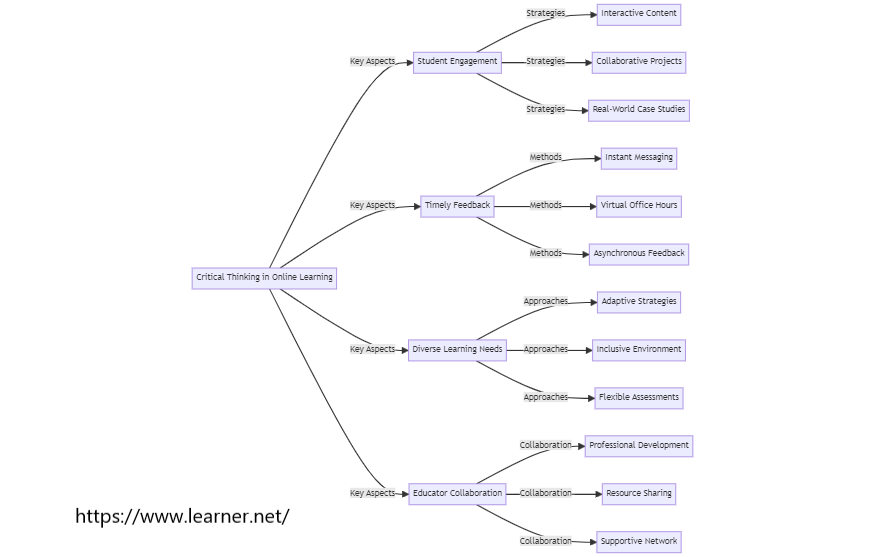In an age defined by information overload, analysis paralysis, and rapid technological advancements, equipping students with the ability to think critically and effectively solve problems has never been more crucial. This imperative task extends beyond the traditional brick-and-mortar classroom, encompassing the burgeoning realm of distance learning. For online tutors, fostering these cognitive skills in their students presents both unique challenges and substantial rewards and benefits.
Critical thinking, at its core, is the multifarious ability to analyze information objectively, evaluate arguments, and to form independent judgments. The ability to actively engage in critical thinking empowers individuals to navigate the complexities of the modern world, making informed decisions in the face of ambiguity and conflicting viewpoints. A recent study by the World Economic Forum found that employers consistently rank critical thinking among the top skills they seek in potential hires, underscoring its relevance in diverse professional fields.
However, fostering critical thinking within the virtual confines of a digital academy or virtual classroom presents the online tutors with some distinct hurdles. The physical separation between tutor and student can serve to impede interactive discussions and real-time feedback, potentially hindering the development of these crucial skills. Additionally, the reliance on digital platforms can encourage passive learning, where students absorb information without actively engaging in analysis or evaluation.
Overcoming these obstacles requires a deliberate and measured approach from online tutors. By incorporating open-ended questions, problem-solving scenarios, and collaborative activities into their curricula, tutors can encourage students to move beyond rote memorization and dive deeper into the material. Interactive platforms and online tools, such as discussion forums and virtual simulations, can further facilitate this process by providing safe spaces for students to test their ideas, exchange perspectives, and learn from each other.
Beyond curriculum design, effective communication and feedback play a pivotal role in cultivating critical thinking. Tutors who pose probing questions, actively listen to student responses, and provide constructive feedback not only assess understanding but also guide students towards independent thought and self-evaluation.
Creating a supportive online learning environment that welcomes diverse viewpoints and respectful disagreement fosters intellectual growth and encourages students to challenge assumptions and consider alternative solutions.
The benefits of prioritizing critical thinking and problem-solving skills in distance learning extend far beyond the digital classroom. Studies have shown that these cognitive abilities are positively correlated with academic success, career advancement, and even civic engagement. Individuals who can think critically are better equipped to adapt to change, solve complex problems, and make informed decisions, both in their personal lives and professional endeavors.
Nurturing critical thinking and problem-solving skills in distance learners is not merely an educational objective but an investment in their future. By understanding and implementing these principles, online tutors can empower their students to become not just adept learners but also well-rounded individuals prepared to thrive in the ever-evolving landscape of the 21st century. The impact of such efforts will resonate far beyond the virtual classroom, equipping students with the intellectual tools they need to navigate the complexities of life and contribute meaningfully to society.
Understanding Critical Thinking in Distance Learning
Equipping students with the tools to navigate information overload and the capacity to develop independent thought is imperative for virtually any teacher or tutor. Critical thinking, the cornerstone of intellectual autonomy, empowers individuals to question, analyze, evaluate, and ultimately to solve problems effectively.
In a world where information bombards us from every screen, these skills hold immense value, transcending the confines of the virtual classroom and shaping success in virtually every facet of life in the modern world.
At its core, critical thinking encompasses a complex configuration of cognitive abilities.
Questioning forms the bedrock of the critical thinking process, encouraging students to challenge assumptions, dive deeper into complex issues and their individual components, and to uncover hidden biases.
Analysis follows, dissecting information into its constituent parts and discerning relationships between them.
Evaluation then takes center stage, weighing evidence, considering alternative perspectives, and being capable of making reasoned and informed judgments.
Problem-solving, the practical application of these skills, allows individuals to navigate challenges, devise solutions, and adapt to unforeseen circumstances. Finally, open-mindedness fuels the entire process, fostering a willingness to consider diverse viewpoints and embrace ambiguity.
While the benefits of cultivating critical thinking are undeniable, the unique characteristics of online learning still presents distinct challenges. The physical separation between tutor and student can impede the dynamic back-and-forth that fuels intellectual discourse.
Limited real-time feedback can further hinder timely course correction and reinforce passive learning habits. Additionally, the reliance on digital mediums can create an isolated environment if not carefully integrated into a larger program, potentially stifling the collaborative exchange of ideas that often ignites critical thinking.
However, these limitations are not insurmountable. Online platforms and tools can be strategically leveraged to not only compensate for these challenges but also create a rich and engaging environment for nurturing critical thinkers.
Open-ended questions woven into online discussions and assignments can spark curiosity and propel students beyond rote memorization. Problem-solving scenarios embedded within simulations and gamified activities can provide safe spaces for students to test their analytical prowess and learn from trial and error.
Collaborative projects, facilitated by online workspaces and communication tools, can also help to foster the exchange of diverse perspectives and the collective construction of knowledge.
Interactive forums and chat rooms, when nurtured as respectful spaces for debate and respectful disagreement, can mimic the intellectual rigor of in-person discussions.
Peer review activities, facilitated by online platforms like Learner Net, can encourage students to analyze and evaluate each other’s work, honing their own critical faculties in the process. Online repositories can provide both primary sources and multimedia materials, which can also empower students to engage in independent research and develop their own conclusions based on factually-based evidence using reasoning skills.
Beyond curriculum design, the role of the online tutor is crucial in fostering a critical thinking culture. By posing probing questions, actively listening to student responses, and providing constructive feedback, tutors can guide students towards independent thought and self-evaluation. Modeling critical thinking through their own communication and explanations further sets the stage for a learning environment that values inquiry and intellectual exploration.
The benefits of prioritizing critical thinking in online learning extend far beyond academic success. Studies have shown a positive correlation between problem solving and critical thinking skills and career advancement, civic engagement, and even personal well-being. Individuals who can think critically are better equipped to adapt to change, solve complex problems, make informed decisions, and engage constructively with the world around them.
The dividends of such efforts will reach far beyond the digital classroom, equipping students with the intellectual tools they need to navigate the information ocean, solve real-world problems, and contribute meaningfully to a rapidly evolving world.
Practical Strategies for Online Tutors
The digital classroom, while offering vast and even more equitable educational opportunities, can present an unexpected obstacle in terms of fostering active engagement with critical thinking.
Online tutors, navigating the virtual divide, need a robust toolbox of practical strategies to ensure their students grapple with thought-provoking challenges, both in conversation and curriculum. Mastering these strategies is not merely an option; it is the key to unlocking student potential and nurturing independent, critical thinkers.
These strategies should bridge the isolation inherent in distance learning. Open-ended questions, carefully woven into discussions and assignments, become intellectual bridges, inviting students to venture beyond surface-level understanding and forge their own paths of thought.
Collaborative projects, facilitated by online platforms, transform into virtual think tanks, where diverse perspectives collide and critical analysis reigns supreme. The tutor, no longer a distant figure on a screen, becomes a co-pilot, guiding students through the labyrinth of information and encouraging them to question, analyze, and evaluate.
These strategies should also breathe life into the curriculum, transforming it from a static collection of facts into a dynamic playground for critical exploration. This can be further aided through the use of Localization and Globalization by the online tutors in their conversations and curriculum preparation. Problem-solving scenarios, embedded within simulations and gamified activities, offer safe spaces for students to test their intellectual muscles and learn from trial and error.
These strategies should further empower tutors to transcend the role of mere instructors and become architects of intellectual engagement. Modeling critical thinking in their own communication and explanations sets the stage for a learning environment that values inquiry and exploration. Probing questions, active listening, and constructive feedback become tools that sculpt and refine students’ thought processes, building confidence and encouraging intellectual ownership.
The benefits of understanding and implementing these strategies extend far beyond the virtual classroom. Students who grapple with critical thinking challenges become active participants in their own learning, not passive recipients of information. They develop the ability to navigate the complexities of the information age, make informed decisions, and solve real-world problems with creativity and resilience. They become the critical thinkers our rapidly evolving world so desperately needs.
Mastering these strategies is not simply a pedagogical nicety for online tutors but a vital responsibility and part of their job function. It is the difference between passive knowledge consumption and active intellectual engagement, between rote memorization and independent thought.
By embracing these strategies, online tutors can bridge the digital divide, unlocking the hidden potential of their students and transforming them from digital learners into critical thinkers equipped to shape their own destinies and contribute meaningfully to the world around them.
Curriculum Design and Activities to Enhance Critical Thinking
Equipping students with the ability to think critically and solve problems has become more crucial than ever. However, designing a curriculum and crafting activities that effectively foster these skills in a virtual environment present unique challenges. This guide dives into practical strategies for online tutors to cultivate critical thinking through curriculum design, engaging activities, and technology integration.
Incorporate open-ended questions and problem-solving scenarios: The online realm can easily fall prey to passive learning, where students simply absorb information without active engagement. To counteract this, incorporating open-ended questions and problem-solving scenarios into the curriculum is essential.
Open-ended questions, unlike their closed-ended counterparts, go beyond factual recall and invite students to delve deeper, explore possibilities, and form their own interpretations. Imagine posing questions like, “What are the potential ethical implications of this scientific discovery?” or “How could this historical event be interpreted from different perspectives?” Such questions spark curiosity, ignite critical analysis, and encourage students to move beyond surface-level understanding.
Similarly, problem-solving scenarios can be woven into the curriculum to provide practical applications for critical thinking skills. Case studies involving real-world dilemmas, simulations of historical events, or even gamified challenges with built-in obstacles all push students to think critically, analyze information, and devise solutions. These scenarios create safe spaces for experimentation, allowing students to learn from trial and error without fear of judgment.
Focus on active learning: The traditional lecture format, often prevalent in online settings, doesn’t always lend itself to active learning. Instead, online tutors should strive to design a curriculum that emphasizes student engagement and interaction.
Case studies, for example, can be used to initiate lively debates in online forums, where students analyze different perspectives, evaluate evidence, and defend their conclusions. Peer review activities, facilitated by online platforms, can encourage students to critically evaluate each other’s work, fostering self-reflection and honing analytical skills in the process.
Collaborative projects, particularly those involving diverse disciplines and viewpoints, can further push students towards active learning. Imagine a cross-curricular project where students in history and science classes must analyze the environmental impact of a historical event. Such projects necessitate communication, collaboration, and critical thinking as students research, analyze, and present their findings in a cohesive manner.
Promote metacognition: Critical thinking thrives in an environment that encourages self-reflection and metacognition, the ability to think about one’s own thinking. Prompting students to reflect on their learning process through exercises like keeping a journal, post-activity discussions, or online surveys, all of which can be insightful.
Questions like, “What challenges did you face in this activity?”, “How could you have approached this problem differently?”, or “What did you learn about your own learning style?” also encourage students to communicate and analyze their strengths and weaknesses, identify areas for improvement, and develop better problem-solving strategies.
Integrate technology effectively: The digital landscape offers a plethora of online tools and platforms that can be leveraged to enhance critical thinking activities in the modern day and age.
Online games, for example, can be designed to incorporate problem-solving scenarios and reward critical analysis. Simulations of historical events or scientific phenomena can provide immersive experiences that encourage students to test hypotheses and make informed decisions.
Mind mapping software, available in both online and offline versions, can be invaluable tools for brainstorming, visually organizing ideas, and identifying connections between seemingly disparate concepts.
Online discussion forums can be transformed into vibrant hubs for critical discourse. By setting clear guidelines for respectful debate and encouraging diverse perspectives, tutors can foster an environment where students learn to analyze arguments, evaluate evidence, and defend their own positions with logic and reason.
Moreover, online repositories of primary sources, digitized historical documents, and multimedia resources can empower students to conduct independent research and draw their own conclusions based on evidence, further bolstering their critical thinking skills.
Empowering the Digital Generation: A Look Toward the Future
Cultivating critical thinking in online learners is not merely an educational objective; it is an investment in their future. By understanding and implementing these strategies, online tutors can empower their students to become not just adept digital learners but also well-rounded individuals equipped to tackle the complexities of the 21st century.
With the ability to think critically, analyze information, and solve problems effectively, these students will be prepared to thrive in a world that demands flexibility, adaptability, and a constant thirst for knowledge.
The digital landscape, with its inherent challenges and vast opportunities, presents a unique platform for nurturing critical thinkers. By embracing innovative curriculum design, engaging activities, and the power of technology, online tutors can equip their students with the intellectual tools they need to navigate the information age, engage constructively with the world around them, and contribute meaningfully to a rapidly evolving future.
Communication and Feedback
Effective communication and feedback are pivotal in the successful teaching of critical thinking skills, particularly in the context of online learning. An open line of communication ensures a transparent and supportive learning environment, fostering the development of analytical thinking in students. This communication should extend beyond the student-tutor dynamic to include parents or guardians, creating a collaborative approach to education.
Transparent communication between the online tutor and the student is crucial in conveying expectations, providing guidance, and offering constructive feedback on critical thinking exercises. As online learning lacks the immediacy of face-to-face interactions, clear and honest communication becomes exceedingly important for facilitating a comprehensive understanding of complex concepts and promoting active engagement.
Furthermore, extending communication to parents or guardians is also beneficial for creating a more holistic educational experience. Involving parents allows them to stay informed about their child’s progress in critical thinking skills and encourages a collaborative effort in supporting the student’s learning journey. This partnership between tutors and families enhances the overall effectiveness of critical thinking instruction.
Create a safe and supportive online learning environment through clear and open communications: Creating a safe and supportive online learning environment is imperative for effective education. Online tutors play a crucial role in fostering such an environment by encouraging open communication, questions, respectful disagreement, and diverse perspectives.
To achieve this, online tutors should actively encourage students to ask questions. Providing a platform for queries promotes a dynamic learning environment, allowing students to seek clarification and deepen their understanding of the subject matter.
Respectful disagreement is another element that contributes to a healthy online learning atmosphere. Online tutors should foster an environment where students feel comfortable expressing dissenting opinions while maintaining respect for diverse viewpoints. This approach not only cultivates critical thinking but also enhances the overall quality of discussions.
Diversity of perspectives should be embraced, recognizing that a variety of backgrounds and experiences contribute to a more robust learning environment. Online tutors should actively seek to include diverse voices and viewpoints in discussions, readings, and assignments. This inclusive approach not only promotes a richer educational experience but also prepares students for an increasingly globalized world.
Creating a safe and supportive online learning environment involves fostering open communication, encouraging questions, respectful disagreement, and embracing diverse perspectives. These practices not only enhance student engagement and achievement but also contribute to the development of critical thinking skills essential for a well-rounded education.
Provide timely and meaningful feedback: Providing timely and meaningful feedback is essential in the online learning environment, emphasizing the importance of focusing on the process of thinking rather than solely on the end result. Research from the Journal of Educational Psychology highlights that timely feedback significantly contributes to students’ academic improvement and overall success.
Online tutors should prioritize the prompt delivery of feedback to maximize its impact on student learning. Students tend to benefit most when feedback is provided in a timely manner, allowing them to reflect on their performance and apply constructive guidance to future tasks.
Meaningful feedback extends beyond mere correction; it involves guiding students through the thinking process. This approach emphasizes not only what went wrong but also why and how to improve.
To achieve this, online tutors should employ a formative feedback approach, concentrating on the ongoing learning process. Formative feedback allows students to understand their strengths and weaknesses, fostering continuous improvement.
Furthermore, linking feedback to the thinking process encourages metacognition, enabling students to reflect on their own thought processes, personally allowing them to experience the role of metacognition in improving critical thinking skills, emphasizing that feedback should guide students in evaluating and refining their thinking strategies.
Providing timely and meaningful feedback in online learning is crucial for student success. Emphasizing the thinking process over the end result aligns with educational best practices. Incorporating insights from various educational journals and associations, online tutors can enhance the learning experience by delivering feedback that guides students through their cognitive development.
Ask probing questions: Asking probing questions is a key strategy for fostering critical thinking skills in students, encouraging them to delve deeper into concepts, justify their conclusions, and consider alternative perspectives.
Online tutors can employ the Socratic questioning method, encouraging students to explore their thought processes. The Socratic method involves posing open-ended questions that prompt students to analyze, evaluate, and articulate their ideas. This approach is valuable in guiding students to justify their conclusions rather than relying on rote memorization.
Starting with lower-order questions to establish foundational knowledge and progressively moving to higher-order questions challenges students to analyze, synthesize, and evaluate information.
Moreover, encouraging students to consider alternative perspectives fosters a more comprehensive understanding of a topic. There is an underlying importance of incorporating diverse viewpoints in questioning. By challenging students to explore different angles, tutors promote critical thinking and cultivate the ability to see beyond a singular viewpoint.
Experience will ultimately highlight the effective nature of peer questioning in deepening student engagement. Incorporating opportunities for students to pose probing questions to their peers encourages collaborative exploration and provides diverse perspectives.
Asking probing questions is a potent tool for online tutors to nurture critical thinking skills. Drawing from established methodologies such as the Socratic method and Bloom’s Taxonomy, tutors can guide students in digging deeper, justifying conclusions, and considering alternative perspectives. Utilizing these approaches contributes to a more robust and enriching online learning experience.
Model critical thinking skills: Modeling critical thinking skills goes beyond the mere use of questioning; it involves a nuanced approach that incorporates imparting knowledge, encouraging questioning, and demonstrating the processes of analysis and evaluation in communication and explanations. Effective modeling should have the ultimate goal of positively influences students’ critical thinking abilities.
Imparting knowledge serves as the foundation for critical thinking. Online tutors must convey information clearly and concisely before prompting students to engage in deeper cognitive processes. The importance of providing a solid informational base to facilitate critical thinking development should not be underestimated. Similarly, a tutor who merely responds to each and every query with another question will not fare any better if they have not taught the lesson to begin with.
The process of imparting knowledge is closely tied to effective communication. By modeling thoughtful questioning, analysis, and evaluation in their own explanations, tutors guide students in understanding how to approach complex concepts. Underscoring the role of modeling in the development of critical thinking is an emphasis on the need for educators to demonstrate the cognitive skills they wish to instill in their students.
Encouraging students to question and analyze information fosters a culture of inquiry. It is usually best to allow for a teaching approach that engages students in questioning assumptions and examining evidence critically, not leaving them baffled about the materials or subjects they need to be contemplating. Modeling this process in communication serves as a powerful example for students as they navigate their own critical thinking journeys.
Additionally, integrating reflective practices in communication further enhances the modeling of critical thinking skills. Educators who openly reflect on their own thought processes contribute to a more conducive environment for critical thinking development.
Modeling critical thinking skills involves a comprehensive approach that includes imparting knowledge, demonstrating thoughtful questioning, analysis, and evaluation in communication, and encouraging a culture of inquiry. Drawing insights from reputable educational sources, online tutors can effectively guide students toward developing robust critical thinking abilities.
Diagram 1: Online Tutors: Catalysts for Critical Thinking in the Digital Age

Building a Critical Thinking Community
The physical distance between students often hinders the spontaneous exchanges and collaborative learning crucial for intellectual growth. To bridge this gap and foster a dynamic environment where critical thinking thrives, building a robust Critical Thinking Community can be a boon to the educational experience for distance learners.
This virtual hub should provide a platform for students to come together, not just as passive recipients of information, but as active participants in a shared journey of exploration and inquiry. Critical thinking flourishes when more diverse perspectives intersect and challenge assumptions.
Group Projects and Activities: Collaborative exercises, from tackling case studies to creating multimedia presentations, require students to engage in open communication, negotiate ideas, and synthesize knowledge. This collaborative process dismantles individual echo chambers and exposes students to new viewpoints, fostering intellectual growth and adaptability.
Online Discussions and Forums: Asynchronous forums and real-time chat rooms offer safe spaces for students to share their thoughts, engage in respectful debate, and learn from each other. These virtual discussions move beyond rote memorization, prompting students to analyze, evaluate, and defend their positions, honing their argumentation skills and critical thinking prowess.
Peer Review and Feedback: Encouraging students to review and provide constructive feedback on each other’s work fosters a culture of mutual learning and accountability. This peer-to-peer interaction pushes students to refine their ideas, consider alternative perspectives, and strive for excellence.
Critical thinking also thrives on curiosity and a thirst for knowledge beyond prescribed boundaries.
Encouraging the Exploration of Additional Resources: Providing curated lists of articles, podcasts, and online repositories equips students with tools to delve deeper into topics and broaden their understanding. This autonomy empowers students to become independent learners and develop their research skills.
Asking Independent Questions: Prompting students to go beyond surface-level inquiries and formulate their own questions fosters intellectual curiosity and a sense of ownership over their learning. This encourages students to think critically about what they are learning and actively seek answers, rather than passively accepting information.
Facilitating Self-Learning Opportunities: Integrating opportunities for independent research projects, online courses, and participation in virtual conferences empowers students to explore their interests, cultivate self-directed learning skills, and become lifelong learners.
Critical thinking also finds its true spark much easier when concepts connect to the real world. A Critical Thinking Community bridges the gap between theory and practice.
Using Case Studies and Real-World Examples: Integrating impactful case studies and real-world scenarios into the curriculum allows students to apply their critical thinking skills to relevant situations. This practical application makes learning more engaging and helps students see the value of critical thinking in everyday life.
Connecting Concepts to Real-World Problems and Situations: Framing discussions and assignments around current events, social issues, and ethical dilemmas encourages students to think critically about complex issues and consider diverse perspectives. This connection to the real world demonstrates the relevance of critical thinking skills and motivates students to engage actively in the world around them.
A Critical Thinking Community has a better chance to thrive within a supportive and encouraging environment. Recognizing and celebrating students’ efforts is crucial for fostering continued engagement and growth:
Acknowledging Progress and Challenges: Applauding both successes and thoughtful inquiries, even if they lead to temporary roadblocks, reinforces the notion that critical thinking is a continuous journey of learning and exploration. This positive reinforcement motivates students to persevere through challenges and embrace the complexities of intellectual growth.
Rewarding Critical Thinking Behaviors: Recognizing and rewarding specific critical thinking behaviors, such as asking insightful questions, engaging in respectful debate, and providing well-reasoned arguments, showcases the community’s values and encourages students to internalize these skills. This positive reinforcement can take various forms, from badges and online accolades to real-world opportunities like leadership roles or conference presentations.
By weaving together these elements, a Critical Thinking Community can transform the digital classroom into a vibrant hub for collaboration, self-directed learning, and real-world application. In this dynamic environment, students are not just recipients of information, but active participants in their own intellectual journey.
They learn to analyze, evaluate, and think critically, developing the skills necessary to navigate the complexities of the modern world and become engaged citizens, lifelong learners, and critical thinkers.
Overcoming Common Challenges
Overcoming challenges in introducing critical thinking and problem-solving skills to distance learners is crucial for fostering a dynamic and engaging digital learning environment. Addressing common issues such as student engagement, limited feedback mechanisms, and diverse learner needs requires strategic planning and collaborative efforts among educators. Drawing insights from reputable sources, this discussion provides practical strategies to tackle these challenges.
Student engagement is a pivotal factor in the success of online critical thinking initiatives. Strategies such as incorporating multimedia content, interactive simulations, and real-world case studies enhance engagement. Additionally, fostering a sense of community through online discussion forums and collaborative projects encourages students to actively participate in critical thinking activities.
One challenge in distance learning is the limited immediacy of feedback. Implementing timely and constructive feedback mechanisms can be effectively done at any time using the Learner Net AI Assistants. Utilizing other technology, such as instant messaging platforms or virtual office hours, also allows for real-time interaction when the tutor is online or on the clock. Additionally, asynchronous feedback through detailed comments on assignments contributes to the ongoing development of critical thinking skills may also be a viable if not immediate option.
Diversity in learning styles and backgrounds requires the integration of adaptive strategies. Providing varied instructional materials, incorporating multiple perspectives, and offering flexible assessment options accommodate more diverse learners. Recognizing and respecting different cultural backgrounds further contributes to an inclusive online learning environment.
Collaboration among educators is one key to overcoming challenges in promoting critical thinking skills in distance learning. Learner Net emphasizes the value of collaborative professional development. Educators can collaborate through platforms like Learner Net’s social media features, designed to facilitate peer interaction and support. Sharing best practices, resources, and success stories creates a supportive network, enhancing the collective effort to nurture critical thinking skills.
Introducing critical thinking and problem-solving skills to distance learners involves addressing challenges related to student engagement, limited feedback mechanisms, and diverse learner needs. By implementing interactive and participatory activities, utilizing technology for timely feedback, adapting strategies for diverse learners, and fostering collaboration among educators, the distance learning environment can be enriched.








5
/5Based on 0 rating(s)
By 02 reviewer(s)
бнанс бонус за рестрацю
Can you be more specific about the content of your article? After reading it, I still have some doubts. Hope you can help me.
бнанс реферальний код
I don’t think the title of your article matches the content lol. Just kidding, mainly because I had some doubts after reading the article.